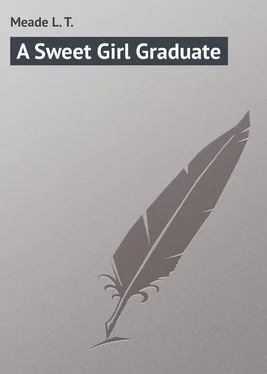Prissie was the reverse of fashionable in her attire; her neat brown cashmere dress had been made by Aunt Raby. The hemming, the stitching, the gathering, the frilling, which went to make up this useful garment were neat, were even exquisite; but then, Aunt Raby was not gifted with a stylish cut. Prissie’s hair was smoothly parted, but the thick plait on the back of the neck was by no means artistically coiled. The girl’s plain pale face was not set off by the severity of her toilet; there was no touch of spring or brightness anywhere, no look or note which should belong to one so young, unless it was the extreme thinness of her figure.
The curious eyes of the students were raised when she appeared, and one or two laughed and turned their heads away. They had heard of her exploit of the night before. Miss Day and Miss Marsh had repeated this good story. It had impressed them at the time, but they did not tell it to others in an impressive way, and the girls, who had not seen Prissie, but had only heard the tale, spoke of her to one another as an “insufferable little prig.”
“Isn’t it too absurd,” said Rosalind Merton, sidling up to Maggie, and casting some disdainful glances at poor Priscilla, “the conceit of some people! Of all forms of conceit, preserve me from the priggish style.”
“I don’t understand you,” said Maggie, raising her eyes and speaking in her lazy voice. “Are there any prigs about? I don’t see them. Oh, Miss Peel,” – she jumped up hastily – “won’t you sit here by me? I have been reserving this place for you, for I have been so anxious to know if you would do me a kindness. Please sit down, and I’ll tell you what it is. You needn’t wait, Rosalind. What I have got to say is only for Miss Peel’s ears.”
Rosalind retired in dudgeon to the other end of the room, and, if the laughing and muttering continued, they now only reached Maggie and Priscilla in the form of very distant murmurs.
“How pale you look,” said Maggie, turning to the girl, “and how cold you are! Yes, I am quite sure you are bitterly cold. Now you shall have a good breakfast. Let me help you. Please, do. I’ll go to the side-table, and bring you something so tempting; wait and see.”
“You mustn’t trouble, really,” began Prissie Miss Oliphant flashed a brilliant smile at her; Prissie found her words arrested, and, in spite of herself, her coldness began to thaw. Maggie ran over to the side-table, and Priscilla kept repeating under her breath —
“She’s not true – she’s beautiful, but she’s false; she has the kindest, sweetest, most comforting way in the world, but she only does it for the sake of an aesthetic pleasure. I ought not to let her. I ought not to speak to her. I ought to go away, and have nothing to do with her proffers of goodwill, and yet somehow or other I can’t resist her.”
Maggie came back with some delicately carved chicken and ham, and a hot cup of delicious coffee.
“Is not this nice?” she said; “now eat it all up, and speak to me afterwards. Oh, how dreadfully cold you do look!”
“I feel cold – in spirit as well as physically,” retorted Priscilla.
“Well, let breakfast warm you – and – and – a small dose of the tonic of sympathy, if I may dare to offer it.”
Priscilla turned her eyes full upon Miss Oliphant.
“Do you mean it?” she said, in a choked kind of voice. “Is that quite true what you said just now?”
“True? What a queer child! Of course it is true. What do you take me for? Why should not I sympathise with you?”
“I want you to,” said Prissie. Tears filled her eyes; she turned her head away. Maggie gave her hand a squeeze.
“Now eat your breakfast,” she said. “I shall glance through my letters while you are busy.”
She leant back in her chair, and opened several envelopes. Priscilla ate her chicken and ham, drank her coffee, and felt the benefit of the double tonic which had been administered in so timely a fashion. It was one of Miss Oliphant’s peculiarities to inspire in those she wanted to fascinate absolute and almost unreasoning faith for the time being. Doubts would and might return in her absence, but in the sunshine of her particularly genial manner they found it hard to live.
After breakfast the girls were leaving the room together, when Miss Heath, the Principal of the Hall in which they resided, came into the room. She was a tall, stately woman of about thirty-five, and had seen very little of Priscilla since her arrival, but now she stopped to give both girls a special greeting. Her manners were very frank and pleasant.
Конец ознакомительного фрагмента.
Текст предоставлен ООО «ЛитРес».
Прочитайте эту книгу целиком, купив полную легальную версию на ЛитРес.
Безопасно оплатить книгу можно банковской картой Visa, MasterCard, Maestro, со счета мобильного телефона, с платежного терминала, в салоне МТС или Связной, через PayPal, WebMoney, Яндекс.Деньги, QIWI Кошелек, бонусными картами или другим удобным Вам способом.












